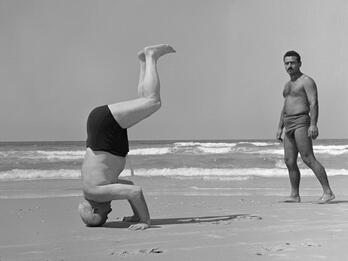Hannah Arendt
Born and educated in Germany, the political theorist and philosopher Hannah Arendt was influenced during her university education by the German-Swiss psychiatrist and philosopher Karl Jaspers (1883–1969) and the German philosopher Martin Heidegger (1889–1976). She fled to France after the Nazi seizure of power in 1933, and then escaped to the United States in 1941, where she remained until her death. She was an editor for Schocken Books and a correspondent for The New Yorker, reporting on the trial of Adolf Eichmann. She taught at various American universities, including the University of Chicago, and the New School for Social Research. Arendt won a reputation as an erudite and provocative writer on political, historical, and philosophical themes. While she worked for Jewish communal organizations in France and in New York before finding a university post, her relations with the Jewish community were often prickly, as a result of her views on Zionism and Jewish responses to Nazi persecution.


